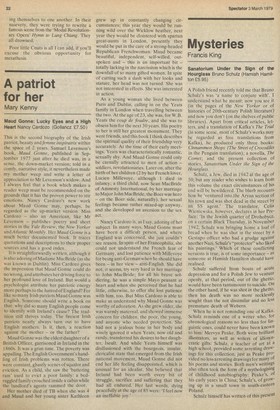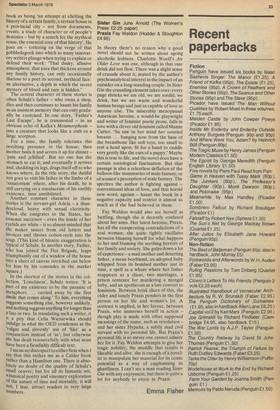Mysteries
Francis King
Sanatorium Under the Sign of the Hourglass Bruno Schulz (Hamish Hamilton £5.95) A Polish friend recently told me that Bruno Schulz's was 'a name to conjure with'. I understand what he meant: now you see it (in the pages of the New Yorker or of histories of 20th-century Polish literature) and now you don't (on the shelves of public libraries). Apart from critical articles, letters, and a translation of Kafka's The Trial (in some sense, most of Schulz's works may be regarded as free translations from Kafka), he produced only three books: Cinnammon Shops (The Street of Crocodiles in the Penguin translation); a novella, The Comet; and the present collection of stories, Sanatorium Under the Sign of the Hourglass. Schulz, a Jew, died in 1942 at the age of 50; but any reader who wishes to learn from this volume the exact circumstances of his end will be bewildered. The blurb recounts how he 'ventured into...the Aryan section of his town and was shot dead in the street by an SS agent.' The translator, Celia Wieniewska, however, declares in her Preface: 'In the Jewish quarter of Drohobycz, on a certain Black Thursday, in November 1942, Schulz was bringing home a loaf of bread when he was shot in the street by a Gestapo officer who had a grudge against another Nazi, Schulz's "protector" who liked his paintings.' Which of these conflicting versions is true, is of some importance — as someone at Hamish Hamilton should have realised.
Schulz suffered from bouts of acute depression and for a Polish Jew to venture openly, at that period, out of the ghetto, would have been tantamount to suicide. On the other hand, if he was shot in the ghetto, then his death was no more recklessly sought than the not dissimilar and no less premature death of Webern. When he is not reminding one of Kafka, Schulz reminds one of a writer who, for chronological reasons no less than for linguistic ones, could never have been known to him: Mervyn Peake. Both were brilliant illustrators, as well as writers of idiosyncratic gifts: Schulz, a teacher of art at a high school, provided some arresting draw ings for this collection, just as Peake provided no less arresting drawings for many of his poems and stories. Both men's writings also often took the form of a mythologising of childhood autobiography: Peake's, of his early years in China; Schulz's, of growing up in a small town in south-eastern Poland. Schulz himself has written of this present book as being 'an attempt at eliciting the history of a certain family, a certain house in a provincial city — not from documents, events, a study of character or of people's destinies — but by a search for the mythical sense, the essential core of that history'. He goes on — tottering on the verge of that gobbledegook into which so many innovatory writers plunge when trying to explain or defend their work: 'That dusky, allusive atmosphere, that aura that thickens around any family history, can only occasionally disclose to a poet its second, mythical face: an alternative, a depth in which the secret mystery of blood and race is hidden.'
The central character of these stories is often Schulz's father — who owns a shop, dies and then continues to haunt his family as an insistent memory that can only gradually be exorcised. In one story, 'Father's Last Escape', he is transmuted — in an obvious echo of Kaflca's Metamorphosis — into a creature that looks like a crab or a large scorpion.
For a time, the family tolerates this revolting presence in the house; then mother boils it and serves it up for dinner — 'pale and jellified'. But no one has the stomach to eat it; and eventually it revives and, shedding its legs, drags itself off to who knows where. In the title story, the dutiful son goes to visit his father in the limbo of a 'sanatorium' where, after his death, he is still carrying on a simulacrum of his earthly existence, time annihilated.
Another constant character in these stories is the servant-girl Adela — a thundercloud, heavy with sexual electricity. When she emigrates to the States, her anaemic successor — even the inside of her eyelids are white — is so absent-minded that she makes sauces from old letters and Invoices and throws cotton-reels into the soup. (This kind of bizarre exaggeration is typical of Schulz. In another story, Father, Who has joined the Fire Brigade, leaps triumphantly out of a window of the house Into a sheet of canvas stretched out below for him by his comrades in the market Square,) In the shortest of the stories in the collection, 'Loneliness', Schulz writes: 'It is Part of my existence to be the parasite of metaphors . . . carried away by the first smile that comes along.' To him, everything suggests something else, however unlikely, and nothing suggests anything for longer than a line or two. In translating such a writer, it !s a pity that Celia Wieniewska should indulge in what the OED condemns as the 'vulgar and slovenly' use of 'like' as a conjunction instead of 'as'; but otherwise she has dealt resourcefully with what must have been a fiendishly difficult text. I mean no disrespect to either firm when I say that this strikes me as a Calder book rather than a Hamilton one. There is absolutely no doubt of the quality of Schulz's small oeuvre; but for all its fantastic wit, Whimsical poetry and visionary exploration of the nature of time and mortality, it will not, I fear, attract readers in very large numbers. In theory there's no reason why a good novel should not be written about ageing alcoholic lesbians. Charlotte Woolf s An Older Love was one, although in that case drink did not flow. There was a slight sense of crusade about it, muted by the author's psychoanalytical interest in the impact of an outsider on a long-standing couple. In Sister Gin the crusading element takes over: every page shrieks we are old, we are sordid, we drink, but we are warm and wonderful human beings and just as capable of love as anyone else. The miserably menopausal American heroine, a would-be playwright and writer of feminist poetic prose, falls in love with a clever old feminist called Mamie Carter. 'Su saw in her mind her coveted breasts . . . hanging now from the base of the breastbone like soft toys, too small to rest a head upon, fit for a hand to cuddle very gently like the ears of a puppy.' Maybe this is true to life, and the novel does have a certain sociological fascination. But that passage is also a relentless deflation of the balloon-like mammaries of male fantasy, or of women's perception of male fantasy. The spectres the author is fighting against — conventional ideas of love, and that horrid new word, ageism — haunt the book in a negative capacity and restrict it almost as much as if she had believed in them.
Fay Weldon would also see herself as battling, though she is decently confused about her aims. Her latest heroine, Praxis, has all the exasperating contradictions of a real woman; she quite rightly vacillates between blaming herself for what happens to her and blaming the seething horrors of her family and society. She gulps down a lot of experience — a mad mother and deserting father, a mean boyfriend, an adopted baby whipped from its bombed mother just in time, a spell as a whore where her father reappears as a client, two marriages, a prison sentence for murdering a mongol baby, and an apotheosis as a late convert to feminism. Between brisk slices of this, the older and lonely Praxis ponders in the first person on her life and woman's lot. A contrast is implied, in her favour, between Praxis, who immerses herself in action — though play is made with other supposed meanings of the name, such as revolution — and her sister Hypatia, a subtly mad civil servant with no personal life. But Praxis's personal life is so messy one cannot admire her for it. Fay Weldon attempts to give her tragic nobility; the muddle that results is likeable and alive, she is enough of a novelist to manipulate her material for its comic potential as a way of emphasising its ghastliness. I can't see a man reading Sister Gin with any enjoyment, but there is quite a lot for anybody to enjoy in Praxis.
Emma Fisher



































 Previous page
Previous page